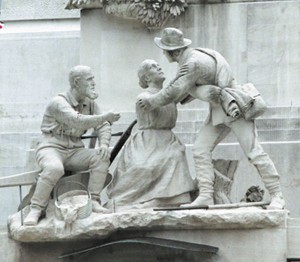–THURSDAY, JUNE 1, 1865 — HUMILIATION DAY –— appointed by President Johnson “for humiliation and prayer, in view of our great national calamity — the death of Abraham Lincoln.” City business was suspended and services held in all of the churches. J. Perry Elliott’s City Gallery, 8-10 E. Washington St, has “fine, large photographs of our lamented President Lincoln.”
The first full week of the month began with the ladies of St. John’s Church giving a Strawberry Festival at the Masonic Hall and the Wesley Chapel ladies serving up strawberries and cream at the church, too. The next day, the ladies of the Universalist Church entertained at the College Hall with a Strawberry and Ice Cream Festival. The Marion County Agricultural and Horticultural Society held its annual exhibition at the Tabernacle with “specimens of fruits, cut flowers, vegetables, table comforts, paintings, fancy needlework, grain and seeds;” refreshments by the young ladies and gentlemen of the Indianapolis Mission Sabbath School — strawberries and cream; ice cream and cake.
While the Conspiracy Trials of those involved in President Lincoln’s assassination dominated national news, the trial of George Washington Hedrick and others of the Daviess County, Indiana conspiracy to murder Captain Eli McCarty, who was engaged in notifying drafted men, ended with the jury returning a guilty verdict. The death sentences of Lambdin P. Milligan and William A. Bowles, who were convicted of conspiring to release rebel prisoners and foment insurrection, were commuted by President Johnson to life in prison, and they were taken from the Soldiers’ Home to the Ohio Penitentiary to serve their sentences. The Journal noted “the public safety does not require their execution now that the war is ended and the national authority is firmly established.”
“Our Heroes Are Returning!” Indiana regiments — 12th-17th-20th-22nd-25th-43rd-48th-58th-59th-63rd-65th-66th-68th-70th-74th-75th-79th-80th-81st-82nd-83rd-84th-85th-86th-87th-88th-91st-97th-99th-100th-101st and men of batteries and cavalry — “dusty and travel worn, but full of life,” began arriving at Camp Carrington — “the work of mustering out the volunteer forces of the Republic goes on briskly.” At the firing of the signal cannon, crowds of citizens gathered almost daily in the afternoon on and about the State House grounds to welcome the regiments as they formed in front of an elaborate stand to receive the accolades of Gov. Morton and other dignitaries. The city band and regimental bands escorted the troops. A dinner was then provided at the Soldiers’ Home where the “soldier-guests” found the tables “covered with provisions that must strongly suggest to them the idea of home.” The saloons were ordered closed, but other businesses were open and the “mustered-out men were purchasing gifts and good things for the dear ones to whom they were coming back.” Many soldiers eager to get home, left before a public reception could be given. The office of paymaster Major Will Cumback’s was “besieged” by soldiers discharged from hospitals seeking their pay; $3,000,000,000 (2014: $45,746,545.52) has been sent to the office to cover payments. By mid-month the last “Reb shook the dust of Camp Morton from his feet and entered into life, liberty and the pursuit of happiness.” Over a hundred destitute refugee families from Atlanta who are “anxious to get back to their homes” were told to file their requests with the secretary of the Indiana Union Relief Association “showing that they are entitled to transportation.”
Many returning soldiers have left mementoes gathered from the battlefields with Madame English at the Museum. Northeast of the city, a short walk from the terminus of the Massachusetts Avenue street railway, government horse auctions were held daily. “Razor-backed chargers” and “noble brutes of departed greatness” destined to the “drudgery of the farmyard.” Sales averaged about a hundred per day.
Commencement exercises were held at Northwestern Christian University (Butler University) and the Indianapolis Baptist Female Institute. At month’s end, Professor Isaiah Rider, author of Rider’s System of Writing, held the first lesson for ladies at the United States Normal Institute of Penmanship in College Hall, southwest corner of Washington and Pennsylvania Streets, and a meeting was held at the Indianapolis Chamber of Commerce to organize a company to build the Indianapolis and Chicago Air Line Railroad.
The Journal observed, “We are glad that the days of anxiety, of blood-shed and sensations are over. It is a relief to let our high strung nerves relax, and a positive rest to turn to the wholesome topics of peace.”



